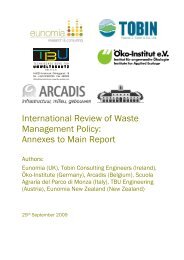Report of the Local Government Efficiency Review Group
Report of the Local Government Efficiency Review Group
Report of the Local Government Efficiency Review Group
Create successful ePaper yourself
Turn your PDF publications into a flip-book with our unique Google optimized e-Paper software.
more focussed than previously on multi-annual budgeting. Public<br />
financing is based on a plan to reduce <strong>the</strong> fiscal deficit to 3% by<br />
2014; in <strong>the</strong>se circumstances, a saving in two to three years time is<br />
just as important as a saving in 2011 and should not be discounted or<br />
devalued because it takes time to be realised.<br />
1.3 Approach and Methodology<br />
1.3.1 The <strong>Group</strong> at its initial meeting agreed an overall approach to its<br />
work and a work programme, with <strong>the</strong> aim <strong>of</strong> meeting <strong>the</strong> deadline <strong>of</strong><br />
reporting by mid-2010.<br />
1.3.2 The <strong>Group</strong> reviewed a large volume <strong>of</strong> financial data and o<strong>the</strong>r<br />
information on local government expenditure and revenue, as well as<br />
staffing levels. These data were examined by service area, by local<br />
authority, and trends identified across a number <strong>of</strong> years. Much <strong>of</strong><br />
this information was held in <strong>the</strong> Department <strong>of</strong> <strong>the</strong> Environment,<br />
Heritage and <strong>Local</strong> <strong>Government</strong> and local authorities, and this was<br />
supplemented by o<strong>the</strong>r sources.<br />
1.3.3 The <strong>Group</strong> launched a public consultation process in February 2010,<br />
inviting submissions from interested organisations and members <strong>of</strong><br />
<strong>the</strong> public. Those making submissions were encouraged to identify<br />
possible savings and efficiencies and ensure that any proposals<br />
being made were relevant to one or more <strong>of</strong> <strong>the</strong> topics covered in <strong>the</strong><br />
<strong>Group</strong>’s <strong>of</strong> reference. A full list <strong>of</strong> those making submissions to <strong>the</strong><br />
<strong>Group</strong> is included as Appendix 1.<br />
1.3.4 The <strong>Group</strong> also held a number <strong>of</strong> meetings with stakeholders,<br />
including representatives <strong>of</strong> local authorities at both elected and<br />
<strong>of</strong>ficial levels, <strong>Government</strong> Departments/ agencies which interact with<br />
local authorities, and o<strong>the</strong>rs. As with <strong>the</strong> written submissions, <strong>the</strong><br />
focus <strong>of</strong> <strong>the</strong>se meetings was also on identifying possible savings and<br />
reductions in expenditure, ei<strong>the</strong>r through efficiencies or through<br />
reducing spend in certain areas. A list <strong>of</strong> those organisations that<br />
met with <strong>the</strong> <strong>Group</strong> is included as Appendix 2.<br />
1.3.5 As issues arose, different papers were prepared by <strong>the</strong> Secretariat<br />
for consideration by <strong>the</strong> <strong>Group</strong> and to inform <strong>the</strong> <strong>Group</strong>’s work and its<br />
recommendations.<br />
1.3.6 Sources for <strong>the</strong>se papers included financial data, previous<br />
evaluations and reviews, VFM reports, information sourced from local<br />
authorities, and international studies and analyses <strong>of</strong> efficiency<br />
initiatives within local government.<br />
9
















